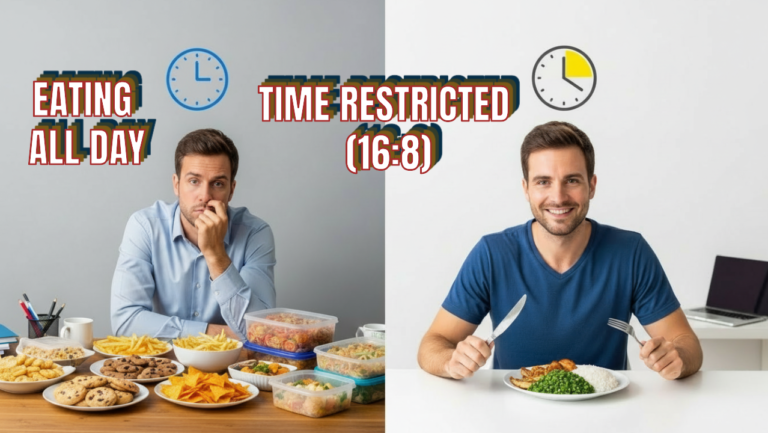
Article 25 of our Series “Nourishing Your Whole Self: The SaziBox Health Guide to Holistic Nutrition”
Getting quality sleep goes beyond just having a comfortable mattress or a quiet room. Food and sleep are closely linked, as what you eat plays a powerful role in determining how well you sleep. A balanced diet doesn’t just fuel your day—it sets the foundation for restful nights. In this guide, we’ll explore the relationship between food and sleep, looking at specific nutrients, foods to embrace or avoid, and dietary tips to help you get the restful sleep you deserve.
How Tryptophan in Food Enhances Your Sleep Quality

Why It Helps: Tryptophan is an essential amino acid that your body uses to produce serotonin and melatonin, both of which help regulate your food and sleep cycles. Serotonin calms the brain, while melatonin signals to your body that it’s time to sleep.
Top Sources: Turkey, eggs, nuts, seeds, cheese, and soy products.
Tip: To maximize tryptophan’s effect, pair it with a small amount of carbohydrates, like a slice of whole-grain toast or a few berries. Carbohydrates help tryptophan cross the blood-brain barrier more easily, enhancing its sleep-promoting effects. Try this combo for a bedtime snack!
Magnesium-Rich Foods for Improved Sleep

Why It Helps: Magnesium is often referred to as “nature’s relaxant.” It calms the nervous system, reduces muscle tension, and relieves stress, making it a great ally for improving food and sleep interactions.
Top Sources: Leafy greens (like spinach and kale), almonds, pumpkin seeds, and dark chocolate.
Tip: If you’re struggling with muscle cramps or restless legs at night, magnesium could be especially beneficial. Try a nightly ritual that includes a magnesium-rich food or consider a warm bath with Epsom salts, which contain magnesium and can promote relaxation.
Read more
Melatonin-Boosting Foods to Improve Your Food and Sleep Cycle

Why It Helps: Melatonin is the hormone that regulates your internal clock and tells your body it’s time to wind down. Eating foods high in melatonin can help promote a natural food and sleep cycle, especially if you struggle with jet lag or irregular sleep patterns.
Top Sources: Tart cherries, walnuts, tomatoes, goji berries, and grapes.
Tip: Incorporate melatonin-rich foods into an evening ritual. For example, enjoy a small bowl of cherries or a handful of walnuts after dinner. Setting aside a specific time each evening to eat these foods helps train your body to expect sleep soon after.
Why Vitamin B6 is Important for the Food and Sleep Connection
Why It Helps: Vitamin B6 plays a role in serotonin production, which influences mood and sleep. A deficiency in B6 can lead to lower serotonin levels, impacting sleep quality and mood regulation.
Top Sources: Bananas, chickpeas, salmon, and fortified cereals.
Tip: Include B6-rich foods in dinner to support serotonin production in the evening. For a sleep-friendly meal, consider grilled salmon with a side of chickpea salad, or try a banana smoothie as an evening snack.
Foods to Avoid for Better Food and Sleep Balance
Certain foods and drinks can interfere with sleep, causing restlessness, wakefulness, or even nightmares. Here are a few to watch out for:
- Caffeine: Found in coffee, tea, chocolate, and many sodas, caffeine can stay in your system for up to 6 hours. Avoid it in the afternoon and evening to maintain a healthy food and sleep balance.
- Alcohol: While it may initially make you feel sleepy, alcohol can disrupt REM sleep, leading to fragmented and lower-quality rest.
- Sugary Foods: Sugar causes blood sugar spikes, which can result in wakefulness or disrupted sleep during the night.
Tip: To satisfy evening cravings without disrupting sleep, choose low-sugar, calming snacks, such as an apple with almond butter or a cup of herbal tea with a small piece of dark chocolate. These options won’t spike your blood sugar and provide relaxing elements to aid in sleep.
Hydration and the Food and Sleep Connection
Why It Helps: Hydration impacts everything from digestion to skin health, and it plays a role in sleep, too. Being dehydrated can make you feel uncomfortable and disrupt sleep.
Top Sources: Water, herbal teas, coconut water, and water-rich foods like cucumber and watermelon.
Tip: Avoid drinking large amounts of fluid close to bedtime to prevent frequent bathroom trips. Instead, focus on hydrating consistently throughout the day and sip a calming herbal tea, such as chamomile or peppermint, about an hour before bed.
General Dietary Tips for Better Sleep
Improving your sleep isn’t only about individual foods but about adopting an overall diet and routine that supports a healthy food and sleep relationship. Here are some simple dietary habits that can help:
- Eat a balanced diet: Make sure you’re getting essential nutrients, especially magnesium, calcium, and B vitamins, which support food and sleep harmony.
- Time Your Meals Right: Try to eat your last meal 2-3 hours before bed to give your body time to digest. Late meals can lead to discomfort and indigestion, making it harder to fall asleep.
- Stay Hydrated: Drink enough water throughout the day, but limit fluids close to bedtime to avoid frequent trips to the bathroom.
Good sleep starts with good nutrition. By making mindful food choices, you can improve your food and sleep connection, feel more refreshed, and enjoy better energy throughout the day. Even small dietary changes can have a big impact—start by adding sleep-promoting foods to your routine and reducing sleep-disrupting choices today.
Interactive Element:
- Is Your Diet Sleep-Friendly? Take our quick quiz to assess your eating habits and their impact on your sleep!





[…] Food and Sleep: How Nutrition Impacts Your Sleep Quality […]